Monday, May 3, 2010
1910-11 Quebec Bulldogs Joe Hall Jersey
At the age of two years old Joe Hall, born in Staffordshire, England on this day in 1882, moved with his family to Winnipeg, Manitoba. In 1902 the 20 year old Hall joined the Brandon Regals of the Manitoba Senior League.
The following season of 1903-04, he skated for the league champion Winnipeg Rowing Club and got his first taste of playoff hockey when the club challenged the Ottawa Silver Seven for the Stanley Cup, with all games to be played in Ottawa. The Silver Seven would win Game 1 of the best-of-three series in a romp, 9-1. Winnipeg fought back against the powerful Silver Seven with a 6-2 victory in Game 2 to force a deciding Game 3, which was won by Ottawa 2-0 to retain the cup for the third of of nine consecutive defenses over three years.
After another season as an amateur with Brandon Wheat Cities in 1904-05, Hall would turn professional with Portage Lake of the International League where he would score 33 goals in 20 games while living up to his nickname of "Bad Joe" by leading the league in penalty minutes with 98 as Portage Lake would win the league championship with a 19-5 record.
Hall while a member of the Portage Lake team
Following his season with Portage Lake, Hall, along with Art Ross, were brought in by the Kenora Thistles for their challenge to the Montreal Wanderers for the Stanley Cup. While Kenora would become the smallest town to ever win the cup, Hall and Ross were reserves and would not see any playing time in the two games.
1907 Stanley Cup holders, the Kenora Thistles
Back again with Brandon Wheat Cities for 1906-07, Hall scored 14 goals in nine games, but was eventually expelled from the league due to a series of violent outbursts and rough play. He relocated to the east, splitting time between Montreal Hockey Club (commonly known as Montreal AAA)- and the Montreal Shamrocks in 1907-08, averaging more than a goal a game. He would play for yet another Montreal club in 1908-09, this time the Montreal Wanderers, scoring 10 goals in five games. Hall was back with the Shamrocks in 1909-10, only this time in the newly formed National Hockey Association (NHA), where he would score seven goals in his first game with the club. His temper eventually got the best of him though, and he was eventually fined and kicked off the team for punching referee Rod Kennedy.
Hall would finally find some stability beginning in 1910-11 when he rejoined the Quebec Bulldogs, also now part of the NHA. Scoring however, proved elusive as Hall completed a transition from forward to defense. His scoring touch returned in full force in 1911-12 as Hall produced 15 goals in 18 games and won his first Stanley Cup when the league champion Bulldogs defeated the Moncton Victorias 9-3 and 8-0.
The Bulldogs would repeat as NHA champions in 1912-13 to retain possession of the Stanley Cup and then fend off a challenge by the Sydney Millionaires in a two-game, total-goal series by a score of 20-5 in which Hall would contribute three goals to earn his second Stanley Cup.
1913-14 was another fine offensive season for Hall, as he scored 13 goals in 19 games. Hall would play three more seasons for the Bulldogs in the NHA before the club would suspend operations due to financial difficulties prior to the 1917-18 season, which was to be the club's first in the brand new National Hockey League (NHL).
When the Quebec players were made available to the other NHL teams, Hall became a member of the Montreal Canadiens, making him teammates with one of his fiercest rivals, the Canadiens Newsy Lalonde.
In 1913, Hall and Lalonde had gone at each other in a game, trading slashes and crosschecks before Hall escalated things with a two-hander aimed at Lalonde's head, which knocked him out cold.
The following season, Lalonde sought his payback and whacked Hall in the head, opening a cut which required eight stitches to close, getting himself tossed from the game. Hall's revenge for that incident came two weeks later, as he charged Lalonde from behind, sending him headfirst into the boards which required ten stitches in return.
Incredibly, Hall and Lalonde would become roommates on the road and best of friends despite their previous intense battles.
Hall scored 8 goals and 15 points in 21 games for his new club and was fined for another stick swinging duel which earned him an arrest on charges of disorderly conduct by the Toronto police.
The 1918-19 season saw the Canadiens win the first half of the season schedule to qualify for the playoffs. They were able to defeat the Ottawa Senators 4 games to 1 to advance to the Stanley Cup Finals, where they would face the Seattle Metropolitains of the Pacific Coast Hockey Association, with all games being played in Seattle.
Seattle romped in Game 1 by a score of 7-0. The Canadiens fought back to win Game 2, 4-2. Seattle responded with another big win, this time 7-2. Game 4 was played to a scoreless tie following a 20 minute overtime. Another overtime game followed in Game 5, when Montreal evened the series 4-3.
What the Canadiens did not realize, was by the time they had reached Seattle, they had already been exposed to the Spanish Influenza virus during a stop in Victoria, British Columbia for a pair of exhibition games. The flu epidemic began in March 1918 and lasted until June 1920, affecting 500 million people, 1/3rd of the Earth's population, killing an estimated 50-100 million people in locations all over the world from the Arctic to remote Pacific Islands, including 50,000 in Canada and an estimated half million to 675,000 in the United States.
Despite being vaccinated against the virus before leaving Montreal, the players began to fall ill, with Hall feeling poor enough that he could not even complete Game 5. With seven of the Canadiens bedridden at one point, the epidemic caused the remainder of the series to be cancelled.
Hall was then admitted to the hospital with a fever of 105º. Eventually all the Canadiens recovered, except for Hall, who died five days later on April 5, 1919 in a Seattle's Columbus Sanatorium at the age of 36.
Bill Coutu, Louis Berlinquette and Lalonde recovered and accompanied Hall home to Brandon, Manitoba to be pallbearers for their teammate.
In 1905, Hall, along with neighbor and shoemaker George Tackaberry designed a custom hockey skate from kangaroo hide with a snug fit and reinforced toe and heel as well as better arch support. Hall liked his new skates so much that other players began trying them out, eventually overwhelming Tackaberry with orders. The skates, named "Tacks" after being purchased by CCM after Tackaberry's death in 1937, were worn by every NHL scoring champion for the next 30 years and the name remains in use today.
Hall was inducted into the Hockey Hall of Fame in 1961.
The barberpole style is best known for it's use by the dominant Ottawa Silver Seven and controversially revived by the Montreal Canadiens for a single game in each of the 2008-09 and 2009-10 seasons as part of their Centennial Jersey Program.
In the absence of any footage of Joe Hall, here's a cheery little film on the Influenza Pandemic of 1918.
Labels:
Hall Joe,
Quebec Bulldogs
Subscribe to:
Post Comments (Atom)

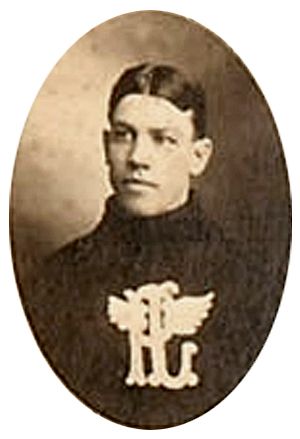
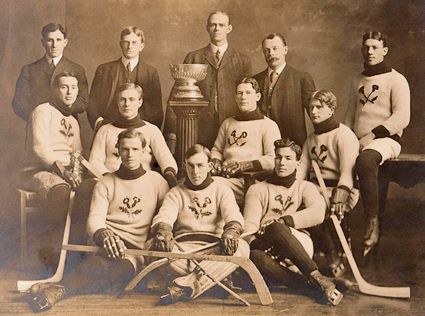
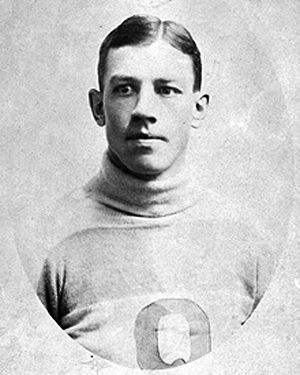
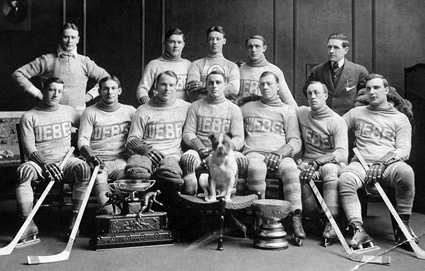
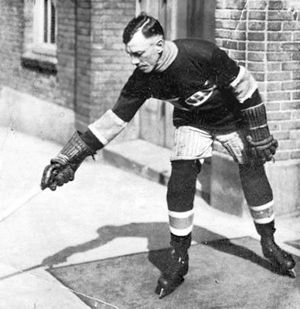
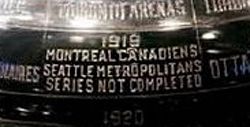
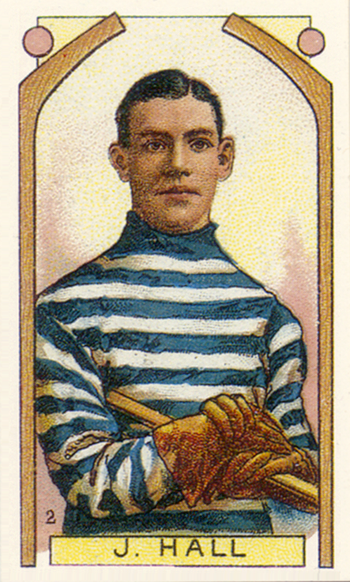










No comments:
Post a Comment
We welcome and encourage genuine comments and corrections from our readers. Please no spam. It will not be approved and never seen.